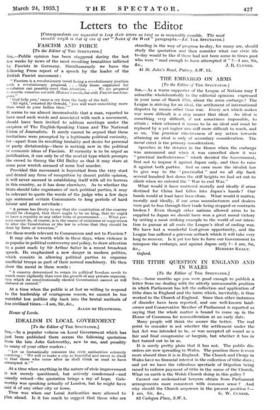Letters to the Editor
[Correspondents are 7-quested to Acep their Idlers as tricf as is reascvabhj possible, The most antic-Lie Icngth is ilat of cne of cur " Aews of the Reek" parographs.—td. '1 HE SPECTATOR.] by Fascists in Germany. Simultaneously we have the following Press report of a speech by the leader, of the British Fascist movement : "Fascism is a revolutionary 'creed facing a revolutionary position with a revolutionary proposaL . . . Only those organised for revolution can possibly meet that situation. . . . We are prepared to nwetthe situation not with Mar,:an's words, but with Fascist machine- pour."
'God help you,' came a cry from the body of the hall.
'All right,' retorted Sir Oswald, you will want something more than wind in your bellies then.'" It seems to 'me almost inconceivable that a man, reported to have used such words and associated with such a movement, should have been invited to address meetings under the auspices of The English-Speaking Union and The National Union of Journalists. It surely cannot be argued that these
invitations were prompted by a legitimate political curiosity, for—apart from its revolting brutality and desire for personal or party dictatorship—there is nothing" new in the political or economic ideas of Fascism. If curiosity is to be urged as justification, it can only be of the morLid type which prompts the crowd to throng the Old Bailey so that it may stare at some poor wretch accused of some foul murder.
Provided this movement is boycotted from the very start and denied any form of recognition by decent public opinion, it will never succeed in establishing itself with all its horrors in this country, as it has done elsewhere. As to whether the State should take cognizance of such political parties, it may be relevant to quote the words of the judge who a few days ago sentenced certain Communists to long periods of hard labour and penal servitude :
"A person has liberty to say that the constitution of the country should be changed, that there ought to be no king, that we ought to have a republic or any other form of government. . . . What per- sons cannot- do, of course, is in the course of criticisms or suggestions to alter the Constitution or the law to advise that they should be done by force or terrorism."
Are these words relevant to Communism and not to Fascism ? It may also be worth while in these days, when violence is BO popular in political controversy and policy, to draw attention to a point made by Sir Arthur Salter in a recent broadcast speech. He emphasized a new danger in modern politics, which consists in allowing political parties to organize unofficial troops as part of their normal machinery. He then thew the moral in these words :
"A country determined to retain its political freedom needs to watch more vigilantly than ever the growth of any private organiza- tion which its coruititutionally elected Government cannot at will disband or control."
At a time when the public is at last sel- willing to respond to the leadership of courageous reason, we cannot be too watchful less politics slip back into the brutal methods of
less civilized times.—I am, Sir, &c., Rouse of Lords. ALLEN OF 11URTWOOD.






































 Previous page
Previous page